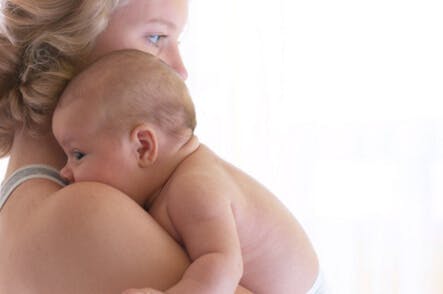Touch is as Important to Infant Health as Eating and Sleeping

Baby massage may seem superfluous or silly to some people, but it’s popularity is growing in the U.S. and it has actually been practiced for centuries in many cultures around the world. But, does it have any significant health benefits? You might be surprised that touch is important to infant health. In fact, touch plays a much more important role in human development than scientists first imagined.
Consider these facts:
- Skin is by far the largest of all of our sense organs.
- It develops early in utero – at less than 8 weeks, when the fetus is less than an inch long, the sense of touch is already highly developed – before there are eyes or ears.
- Between the pulsing of the amniotic fluid and the contracting and expansion of the walls of the womb, the uterine environment is a space of constant massage.
- When a baby is born, his vision is still fuzzy, but touch is a primary way he can interact with the world for the first few months.
Just from these basic biological facts, it becomes clearer that touch must be important for infant development. But, to what extent? Here’s a snapshot of the myriad medical benefits researchers have discovered over the years.
- In 1986. Dr. Tiffany Fieldand her colleagues gave preterm infants a 15-minute massage, three times per day, for ten days resulting in 21-47% greater weight gain than standard care alone. Those infants were also discharged six days earlier on average than control infants, saving approximately $10,000 in hospital costs per infant. Since then, they’ve also found:
- Infants who experienced massage therapy cried less and had lower cortisol levels, suggesting lower stress.
- Touch stimulation can positively affect physiological, behavioral, and social development among infants.
- Young children with eczema who received daily massage from their parents saw symptoms decrease.
- Dr. Kathryn Barnard at the University of Washington found that infants who were held more showed superior cognitive development as long as eight years later.
- Research by Theodore Wacks, a psychologist at Purdue, showed that infants who experienced more skin-to-skin contact had an advantage in mental development in the first six months of life.
It turns out infant touch benefits pretty much all systems of the body – nervous, circulatory, digestive, respiratory, endocrine – the impacts are profound.
And, the benefits aren’t just for babies. You can probably guess that parents sleep better when babies sleep better (which they do with infant touch). And, it reduces parental stress levels, too! Field found that mothers who do infant massage report lower levels of depression, they seem to be more sensitive to their baby’s cues and the babies are more responsive to the mother through the whole first three months.
Still question whether touch is as important as eating and sleeping? Consider one more landmark study.
In the 1960s, Dr. Harry Harlow separated infant monkeys from their mothers at six to twelve hours after birth and substituted “surrogate” mothers made either of heavy wire mesh or of wood covered with cloth. Both mothers were the same size, but the wire mother had no soft surfaces and was equipped with a bottle from which the baby could “nurse”while the other mother was cuddly, covered with foam rubber and soft terry cloth, but had no food. Despite the fact that only one surrogate mother could feed them, the infants still spent more time cuddling with the cloth mother. (They also found that the monkeys”raised” by wire mesh moms were very aggressive as adults.) These results led researchers to believe closeness and affection are as imperative to healthy development as food.
In today’s busy world, it’s all-too-common for parents to give a child a pacifier or put them in front of a video screen to keep them calm and quiet. But, those convenient moments of calm may be having subtle impacts on your child’s development. Take time to slow down. Take time to touch. Take time to cuddle. They aren’t babies for long and your investment of time and touch is a priceless investment in their health and well-being.


